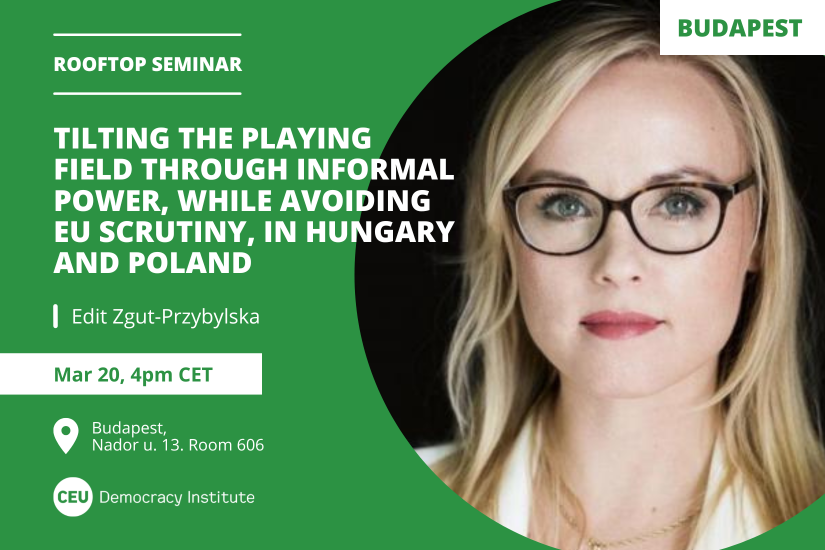
The De- and Re-Democratization Workgroup of the CEU Democracy Institute cordially invites you to its next Rooftop Seminar.
If you would like to attend, please register here.
Please keep in mind that external guests will not be able to enter the building without prior registration.
While democratic backsliding and the EU’s constraining role has received a notable scholarly attention from the formal, legal perspective, its responses (or lack thereof) to the informal exercise of power in Central and Eastern Europe is still understudied. This working paper aims to fill this gap by looking at the case of Hungary and Poland where the governments tilted the playing field informally since 2010 and 2015 respectively. This working paper applies the concept of informal power to explain how the Hungarian and Polish government captured the media in an uncodified, informal way under the radar of the European Union. Despite the EU coming up with doctrinal and policy innovations, it failed to force Hungary and Poland to comply with the core values of the EU. Triggering the Rule of Law Conditionality Mechanism against Hungary and withholding multiple financial transfers both from Poland and Hungary marked a turning point in the Rule of Law dispute within the EU. The working paper briefly explains the linkages between the informal power, in particular media capture in Hungary and Poland and the responses of the EU institutions. The theoretical expectation is that due to the increasing politicization of the EU’s sanctioning behavior, the EU addresses certain aspects of informal power and ignores others in a selective way. Empirically, the paper maps the legal and political toolkit of the EU and how it addressed democratic backsliding in Hungary and Poland, before and after Russia invaded Ukraine.
The paper is available at request from the author.
Speaker:
Edit Zgut-Przybylska is a visiting fellow at CEU Democracy Institute within the auspices of her re:constitution Fellowship 2022-2023. She received PhD in Sociology from GSSR at the Institute of Philosophy and Sociology (IFIS) in the Polish Academy of Sciences. She holds an MA in Political Science from ELTE TÁTK and graduated as a journalist at Bálint György Journalism Academy. She is a researcher at the European Studies Unit at IFIS, her research interest covers informality and populism in power in the context of democratic backsliding. She published in peer-reviewed journals like the European Politics and Society and the Hague Journal on the Rule of Law. She is the Vice-President of Amnesty International in Hungary and a fellow at Visegrad Insight. Currently, she is a visiting lecturer at the Foreign Service Institute of the US State Department. She previously worked at Political Capital Research Institute and prior to that, she was a journalist at various media outlets in Hungary.
Discussant:
Barbara Grabowska-Moroz is a Postdoctoral Fellow at CEU Democracy Institute. In 2018-2021 she was a postdoc researcher at the University of Groningen (the Netherlands). In 2010-2018 she worked as a lawyer and a project coordinator in the Helsinki Foundation for Human Rights (Warsaw, Poland). She is an expert in the current rule of law crisis in the EU, Poland in particular. Her current research deals with the abuse of comparative law in the context of the rule of law backsliding. Her expertise deals also with the international and constitutional standards regarding the oversight of secret security services.
Chair:
Alexander Bor is a Postdoctoral Fellow at the CEU Democracy Institute's De- and Re-Democratization Workgroup, and a Visiting Professor at CEU Vienna. He received an MA in Political Science at the CEU in 2012, and a PhD in Political Science at Aarhus University in 2018, where he also worked as a postdoc until 2022. His research focuses on how the human mind navigates social and political challenges like political polarization, online political hostility, the COVID-19 pandemic, or selecting and evaluating political leaders. His work integrates insights from political behavior, social and evolutionary psychology, and public health. He employs diverse quantitative analytical tools like surveys, experiments and machine learning. His work has been published in leading journals (including PNAS, APSR, and Psych Science) and covered by international media outlets (e.g. New York Times, Washington Post, The Atlantic). At CEU, Alexander teaches courses on quantitative research methods.